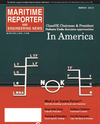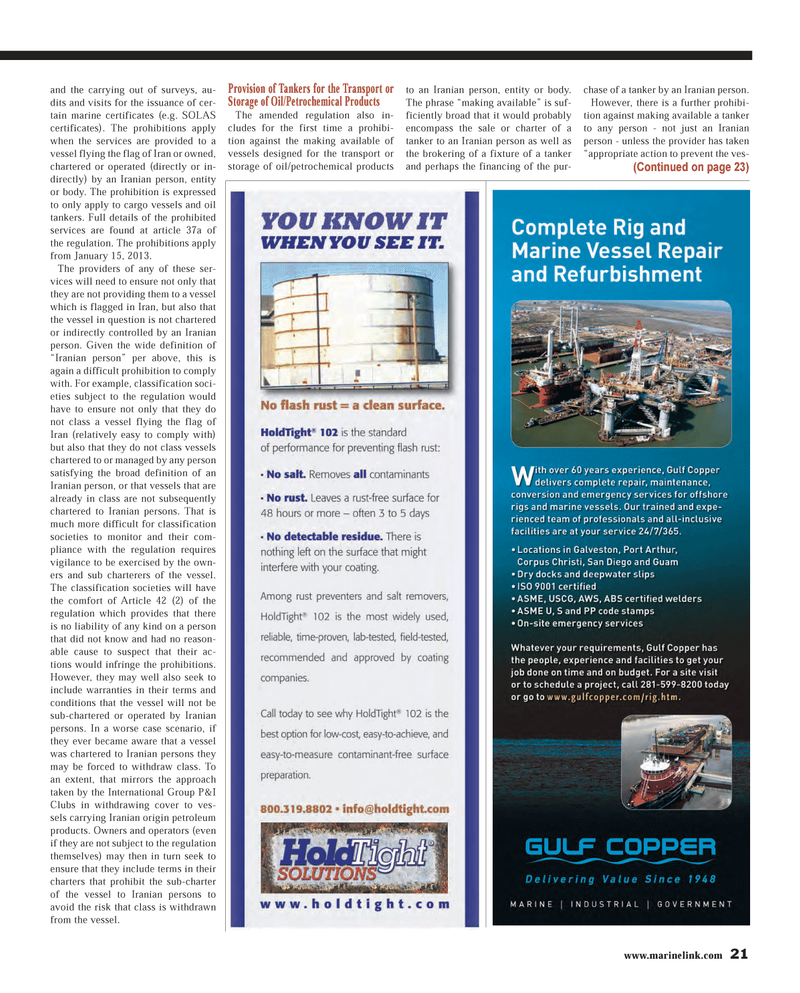
Page 21: of Maritime Reporter Magazine (March 2013)
U.S. Coast Guard Annual
Read this page in Pdf, Flash or Html5 edition of March 2013 Maritime Reporter Magazine
www.marinelink.com 21and the carrying out of surveys, au-dits and visits for the issuance of cer- tain marine certificates (e.g. SOLAS certificates). The prohibitions apply when the services are provided to a vessel flying the flag of Iran or owned, chartered or operated (directly or in-directly) by an Iranian person, entity or body. The prohibition is expressed to only apply to cargo vessels and oil tankers. Full details of the prohibited services are found at article 37a of the regulation. The prohibitions apply from January 15, 2013.The providers of any of these ser- vices will need to ensure not only that they are not providing them to a vessel which is flagged in Iran, but also that the vessel in question is not chartered or indirectly controlled by an Iranian person. Given the wide definition of ?Iranian person? per above, this is again a difficult prohibition to comply with. For example, classification soci-eties subject to the regulation would have to ensure not only that they do not class a vessel flying the flag of Iran (relatively easy to comply with) but also that they do not class vessels chartered to or managed by any person satisfying the broad definition of an Iranian person, or that vessels that are already in class are not subsequently chartered to Iranian persons. That is much more difficult for classification societies to monitor and their com-pliance with the regulation requires vigilance to be exercised by the own-ers and sub charterers of the vessel. The classification societies will have the comfort of Article 42 (2) of the regulation which provides that there is no liability of any kind on a person that did not know and had no reason-able cause to suspect that their ac-tions would infringe the prohibitions. However, they may well also seek to include warranties in their terms and conditions that the vessel will not be sub-chartered or operated by Iranian persons. In a worse case scenario, if they ever became aware that a vessel was chartered to Iranian persons they may be forced to withdraw class. To an extent, that mirrors the approach taken by the International Group P&I Clubs in withdrawing cover to ves-sels carrying Iranian origin petroleum products. Owners and operators (even if they are not subject to the regulation themselves) may then in turn seek to ensure that they include terms in their charters that prohibit the sub-charter of the vessel to Iranian persons to avoid the risk that class is withdrawn from the vessel.Provision of Tankers for the Transport or Storage of Oil/Petrochemical Products The amended regulation also in-cludes for the first time a prohibi-tion against the making available of vessels designed for the transport or storage of oil/petrochemical products to an Iranian person, entity or body. The phrase ?making available? is suf-ficiently broad that it would probably encompass the sale or charter of a tanker to an Iranian person as well as the brokering of a fixture of a tanker and perhaps the financing of the pur- chase of a tanker by an Iranian person.However, there is a further prohibi- tion against making available a tanker to any person - not just an Iranian person - unless the provider has taken ?appropriate action to prevent the ves-(Continued on page 23)MR #3 (18-25).indd 21MR #3 (18-25).indd 212/26/2013 3:53:12 PM2/26/2013 3:53:12 PM

 20
20

 22
22
